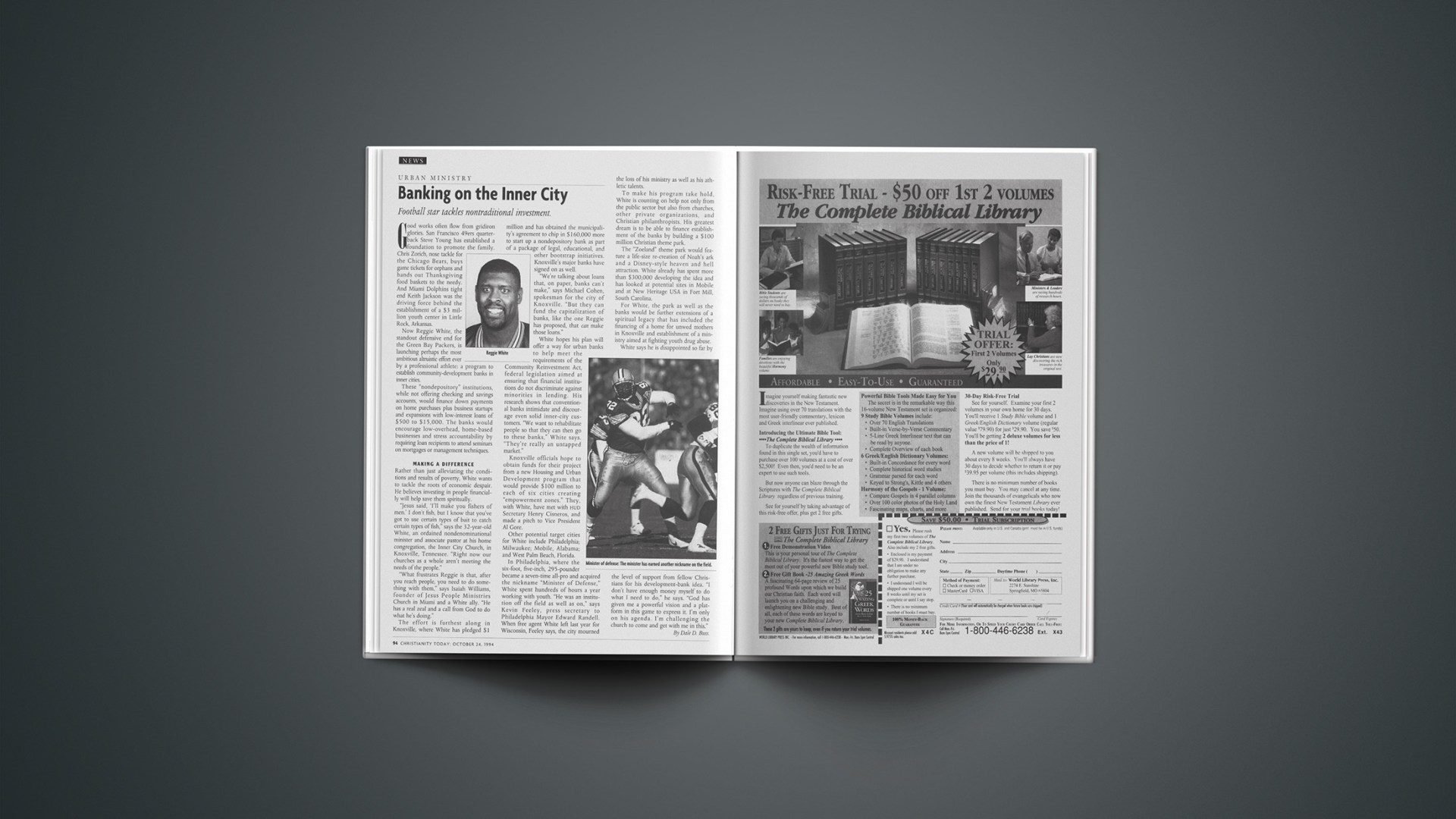Football star tackles nontraditional investment.
Good works often flow from gridiron glories. San Francisco 49ers quarterback Steve Young has established a foundation to promote the family. Chris Zorich, nose tackle for the Chicago Bears, buys game tickets for orphans and hands out Thanksgiving food baskets to the needy. And Miami Dolphins tight end Keith Jackson was the driving force behind the establishment of a $3 million youth center in Little Rock, Arkansas.
Now Reggie White, the standout defensive end for the Green Bay Packers, is launching perhaps the most ambitious altruistic effort ever by a professional athlete: a program to establish community-development banks in inner cities.
These “nondepository” institutions, while not offering checking and savings accounts, would finance down payments on home purchases plus business startups and expansions with low-interest loans of $500 to $15,000. The banks would encourage low-overhead, home-based businesses and stress accountability by requiring loan recipients to attend seminars on mortgages or management techniques.
MAKING A DIFFERENCE
Rather than just alleviating the conditions and results of poverty, White wants to tackle the roots of economic despair. He believes investing in people financially will help save them spiritually.
“Jesus said, ‘I’ll make you fishers of men.’ I don’t fish, but I know that you’ve got to use certain types of bait to catch certain types of fish,” says the 32-year-old White, an ordained nondenominational minister and associate pastor at his home congregation, the Inner City Church, in Knoxville, Tennessee. “Right now our churches as a whole aren’t meeting the needs of the people.”
“What frustrates Reggie is that, after you reach people, you need to do something with them,” says Isaiah Williams, founder of Jesus People Ministries Church in Miami and a White ally. “He has a real zeal and a call from God to do what he’s doing.”
The effort is furthest along in Knoxville, where White has pledged $1 million and has obtained the municipality’s agreement to chip in $160,000 more to start up a nondepository bank as part of a package of legal, educational, and other bootstrap initiatives. Knoxville’s major banks have signed on as well.
“We’re talking about loans that, on paper, banks can’t make,” says Michael Cohen, spokesman for the city of Knoxville. “But they can fund the capitalization of banks, like the one Reggie has proposed, that can make those loans.”
White hopes his plan will offer a way for urban banks to help meet the requirements of the Community Reinvestment Act, federal legislation aimed at ensuring that financial institutions do not discriminate against minorities in lending. His research shows that conventional banks intimidate and discourage even solid inner-city customers. “We want to rehabilitate people so that they can then go to these banks,” White says. “They’re really an untapped market.”
Knoxville officials hope to obtain funds for their project from a new Housing and Urban Development program that would provide $100 million to each of six cities creating “empowerment zones.” They, with White, have met with HUD Secretary Henry Cisneros, and made a pitch to Vice President Al Gore.
Other potential target cities for White include Philadelphia; Milwaukee; Mobile, Alabama; and West Palm Beach, Florida.
In Philadelphia, where the six-foot, five-inch, 295-pounder became a seven-time all-pro and acquired the nickname “Minister of Defense,” White spent hundreds of hours a year working with youth. “He was an institution off the field as well as on,” says Kevin Feeley, press secretary to Philadelphia Mayor Edward Randell. When free agent White left last year for Wisconsin, Feeley says, the city mourned the loss of his ministry as well as his athletic talents.
To make his program take hold, White is counting on help not only from the public sector but also from churches, other private organizations, and Christian philanthropists. His greatest dream is to be able to finance establishment of the banks by building a $100 million Christian theme park.
The “Zoeland” theme park would feature a life-size re-creation of Noah’s ark and a Disney-style heaven and hell attraction. White already has spent more than $300,000 developing the idea and has looked at potential sites in Mobile and at New Heritage USA in Fort Mill, South Carolina.
For White, the park as well as the banks would be further extensions of a spiritual legacy that has included the financing of a home for unwed mothers in Knoxville and establishment of a ministry aimed at fighting youth drug abuse.
White says he is disappointed so far by the level of support from fellow Christians for his development-bank idea. “I don’t have enough money myself to do what I need to do,” he says. “God has given me a powerful vision and a platform in this game to express it. I’m only on his agenda. I’m challenging the church to come and get with me in this.”
Copyright © 1994 Christianity Today. Click for reprint information.










